用适当的be动词或助动词填空
(完整版)用适当形式填空解题技巧及练习

关于“用适当形式填空”各题型汇总及练习1. 动词(包括be动词,助动词,和实义动词):特指动词变化与时态相关的情况1)Listen, the birds ___________ (sing) in the tree.2)The room is dirty. What ______ you ______ (do) just now?3)______ Miss Li ______ (have) a long holiday?4)My mother usually ______ (cook) at 5 o'clock.5)_______ Helen like _______ (swim)?Yes, she ______. Look, she __________ (swim) now.6)______ ( do not ) kick the ball.7) That girl can ______ (sing) French songs.8) I often _____to school at seven every morning. My sister often ______ to school with me. I________to school now. But I ______ to school late yesterday. (go)9) My younger brother ________ a lot of ice-cream last night. So he can't______anything today. The doctor says to him: 'Don't______too much.' So he ______a little today. (eat)10) Last week, I ______ a Beijing opera show. It was interesting. I am _________________ it again next week. (see)2. 数词:考虑基数词--- 序数词的转化1)It's the ______ of May. There are _______ students in the playground. (twelve)2)Miss Li lives on the _______ (two) floor in this building.3. 人称代词类:考虑主格,宾格,形容词性物主代词,名词性物主代词,反身代词1)I have a beautiful cat. _______name is Mimi. These cakes are ________. ( it )2)Shall ______ have a look at that classroom? That is ______ classroom. ( we )3)_______ is my aunt. Do you know _______ job? _______a nurse. ( she )4)Don't worry. I can do it by __________. (I)5)I have a lovely brother. _______ is only 3. I like ________ very much. ( he )6)May I sit beside _________? ( you )7)_______ (who) comb is this? It's ______ (she), I think.4. 名词: 考虑名词单复数情况1)Many ______ (child) like ice creams.2)These _______ (people) are looking at the moon now.3)Ma Ming wants to take some _______ (photo).5. 表示国家:考虑国家、语言、人种:1)That girl can ______ (sing) French songs.2)Yang Ling is a _______ (China) girl.3)Jim is from _______. He speaks ________. (France)4)Jack is from _______. He speaks ________. (German)6. 形容词、副词的比较级、最高级:(详见比较级、最高级专项练习)7. 动词、名词、形容词、副词之间的相互转化:(此处指动词变化与时态无关的情况)1)动词、形容词的转化a. 词尾加ful:use - useful, care - careful, help - helpful, thank - thankful, peace - peaceful, forget - forgetful, play - playful, succeed - successful, wonder - wonderfulb. 词尾加d /ed:please - pleased, unite - united, excite - excited, surprise - surprised, use - used, organize - organized, close - closed, relax - relaxed, develop - developed, appreciate - appreciated , frustrate - frustrated, interest - interested, annoy - annoyed, frighten - frightened, crowd - crowded, pollute - pollutedc. 词尾加ing:interest - interesting, surprise - surprising, excite - exciting, develop - developing, frighten - frightening, thrill - thrilling, frustrate - frustrating, relax _ relaxing, live - living, rock - rocking, sleep - sleepingd.词尾变y为i,加ed:worry - worried, marry - married, fry - fried, terrify - terrified, satisfy - satisfiede.词尾加able:know - knowledgeable, enjoy - enjoyabe, suit - suitable, adjust - adjustable, comfort - comfortable, believe - believablef. 词尾加less:care-careless, use-useless, hope-hopelessg. 词尾加ive / aive:create-creative, attract-attractive, act-active, talk-talkative, correct - correctiveh. 其它:lose - lost, fool - foolish, live - lively / alive /living, sleep - sleepy / sleeping / asleep, wake - awake, taste - tasty,speak - spoken, break - broken, die - dead, educate - educational, world - worldwide,imagine---imaginary ……2)动词、名词的转化:a. 词尾+mentmove-movement,agree-agreement,govern-government,manage-management,equip-equipment,argue-argumentb. 词尾+tion/cion/sion:decide-decision, educate-education, dictate-dictation, graduate-graduation, invent-invention,invite-invitation, pollute-pollution, compete, competition, instruct-instruction, conclude-conclusion, express-expression, satisfy-satisfaction, produce-productionc. 词尾+ingswim-swimming, bath-bathing, build-building, learn-learning, write-writingd. 词尾-er/ar/ist/ess (表示职业和身份):beg-beggar,act-actor,act-actress, teach-teacher, educate-educator, cook-cooker, wash-washer, e. 词尾-ice;serve-service, note-notice,f. 其他:press-pressure,sit-seat, fly-flight, heat-heat, mix-mixture, ……1) This dictionary is ____________ (help).2) The girls likes ___________ (sit) quietly.3) He is a ____________ (succeed) actor.4) Please read the __________ (note) carefully before writing your answer.5) There is a ___________ (beg) under the bridge.3)名词、形容词的转化:a. 结尾+y:health-healthy, cloud-cloudy, rain-rainy, luck-lucky, sun-sunny, noise-noisy, ice-icy, shine-shiny , silk-silky, fur-furry, taste-tastyb. 结尾+ed:spot-spotted, talent-talented, balance-balanced,c. 结尾-ly: (注意区分ly结尾的副词)friend-friendly, love-lovely, live-lovelyd. 结尾-ce改-t:difference-different, silence-silent, confidence-confidente. 结尾-ous:danger-dangerous, mystery-mysterious,f. 结尾-al:music-musical, medicine-medical, nature-natural, tradition-traditional, origin-original , person-personal, g. 结尾-less/ful:home-homeless, hope-hopeless, beauty-beautiful, meaning-meaningful , color-colorful, pain-painful, thank-thankfulh. 结尾-able:value-valuable, adjust-adjustable, suit-suitable, knowledge-knowledgeable, comfort-comfortablei. 结尾-en:wood-wooden, wool-woolenj. 其他……fool-foolish, freedom-free, love-loving, death-dead, pleasure-pleasant, popularity-popular, pride-proud, scientist-scientific, energy-energetic, height-high4)形容词、副词的转化:结尾-ly:careful-carefully, lucky-luckily, heavy-heavily, happy-happily, angry-angrily, sudden-suddenly, absolute-absolutely, true-truly, wide-widely, useful-usefully,possible-possibly8. 一词多词性及其他特殊情况:1)动词、名词同形(意义不同):book, seat, water, shoulder2)形容词、副词同形:fast, right, late, last, hard, well, straight, high, pretty, tight, short1) That is a very _______ train. It goes very ________. (fast)2) He is a _________ worker. He works ________. (hard)3) It is a _________ road. It runs __________ for miles. (straight)4) She is a ___________ girl. That is a __________ good picture. (pretty)5) I'm afraid he is not ________. He can sing __________. (well)3)以下词加-ly, 意义完全不同,并非是词性之间的相互转化:early, far, fast, hard, high, late, often, past, right, soon例句:1) He came late. I haven't seen him lately.2) The team played fair. He did fairly well in his examination.3) My grandparents live quite near. I nearly made a mistake.4) We had to work hard. They could hardly find their way.5) The boy climbed high up the tree. She is highly interested in history.6) He studied deep into the night. He is deeply grateful for our support.7) The car stopped short at the gate. (in an abrupt way; suddenly)He will come shortly (= soon).8) Please be back at 6 o'clock sharp. The father spoke sharply to the boy.9) You guessed wrong. He was wrongly accused of the crime。
be动词和助动词专项训练
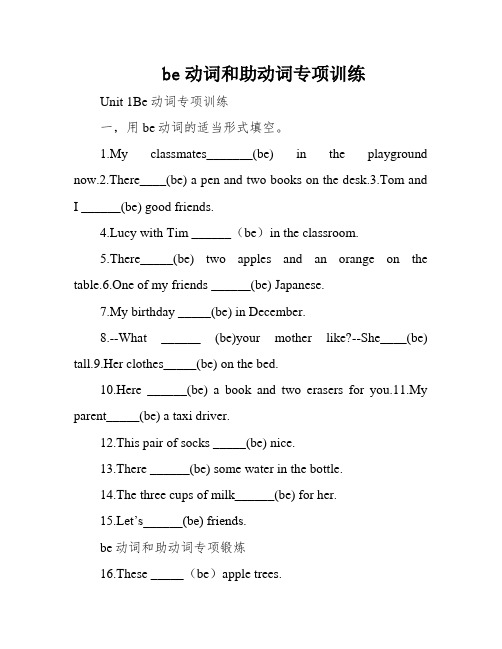
be动词和助动词专项训练Unit 1Be动词专项训练一,用be动词的适当形式填空。
1.My classmates_______(be) in the playground now.2.There____(be) a pen and two books on the desk.3.Tom andI ______(be) good friends.4.Lucy with Tim ______(be)in the classroom.5.There_____(be) two apples and an orange on the table.6.One of my friends ______(be) Japanese.7.My birthday _____(be) in December.8.--What ______ (be)your mother like?--She____(be) tall.9.Her clothes_____(be) on the bed.10.Here ______(be) a book and two erasers for you.11.My parent_____(be) a taxi driver.12.This pair of socks _____(be) nice.13.There ______(be) some water in the bottle.14.The three cups of milk______(be) for her.15.Let’s______(be) friends.be动词和助动词专项锻炼16.These _____(be)apple trees.17.Three and five _____(be) eight.18.Maths ______(be) very interesting.19.---Where_____(be) Lucy and Lily ?---They _____(be) at home.20.I want to _____(be) a teacher in the future.21.There____(be) XXX.22.There____(be) some apple juice in the glass.23.______(be) XXX?24.Everyone in my class_____(be) kind.25.The child over there ______(be) lovely.二.选择题,在正确的答案后面打钩。
be动词、助动词、情态动词用法总结及练习
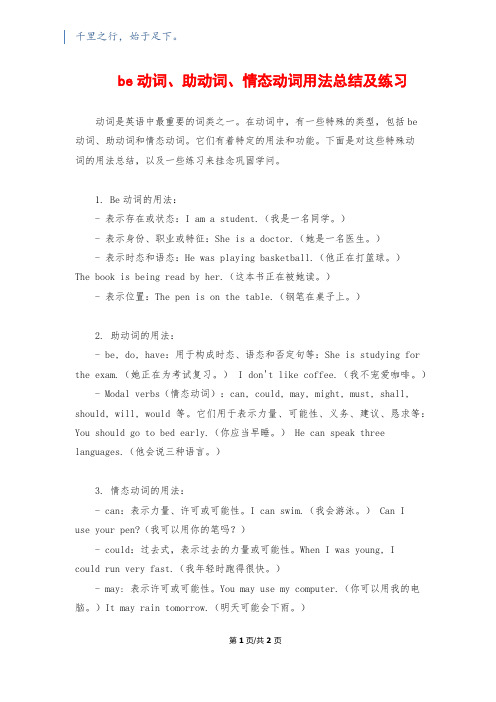
千里之行,始于足下。
be动词、助动词、情态动词用法总结及练习动词是英语中最重要的词类之一。
在动词中,有一些特殊的类型,包括be动词、助动词和情态动词。
它们有着特定的用法和功能。
下面是对这些特殊动词的用法总结,以及一些练习来挂念巩固学问。
1. Be动词的用法:- 表示存在或状态:I am a student.(我是一名同学。
)- 表示身份、职业或特征:She is a doctor.(她是一名医生。
)- 表示时态和语态:He was playing basketball.(他正在打篮球。
)The book is being read by her.(这本书正在被她读。
)- 表示位置:The pen is on the table.(钢笔在桌子上。
)2. 助动词的用法:- be, do, have:用于构成时态、语态和否定句等:She is studying for the exam.(她正在为考试复习。
) I don't like coffee.(我不宠爱咖啡。
)- Modal verbs(情态动词):can, could, may, might, must, shall, should, will, would等。
它们用于表示力量、可能性、义务、建议、恳求等:You should go to bed early.(你应当早睡。
) He can speak three languages.(他会说三种语言。
)3. 情态动词的用法:- can:表示力量、许可或可能性。
I can swim.(我会游泳。
) Can Iuse your pen?(我可以用你的笔吗?)- could:过去式,表示过去的力量或可能性。
When I was young, Icould run very fast.(我年轻时跑得很快。
)- may: 表示许可或可能性。
You may use my computer.(你可以用我的电脑。
be动词用法和练习题

be动词用法和练习题be动词是英语语法中最基础、最常用的动词之一。
它的形式包括am、is、are、was、were、been等。
在句子中,be动词通常用来表示主语的状态、特征、身份、职业、国籍等等。
本文将介绍be动词的用法,并附上一些练习题供读者巩固掌握。
一、be动词的基本用法1. 表示身份和职业例如:- I am a student.(我是一名学生。
)- He is a doctor.(他是一名医生。
)2. 表示状态和特征例如:- She is tired.(她累了。
)- The house is big.(这所房子很大。
)3. 表示存在和位置例如:- They are at home.(他们在家。
)- The book is on the table.(书在桌子上。
)4. 表示时间和日期例如:- It is Monday today.(今天是星期一。
)- The party is on Friday.(聚会在星期五。
)5. 表示感觉和情绪例如:- We are happy.(我们很开心。
)- She is sad.(她很伤心。
)二、be动词的时态变化1. 现在时- am用于第一人称单数,即“I am”表示“我是”。
- is用于第三人称单数,即“He/She/It is”表示“他/她/它是”。
- are用于第一人称复数和第二人称单数/复数,即“We/You/They are”表示“我们/你们/他们是”。
2. 过去时- was用于第一人称单数和第三人称单数,即“I/He/She/It was”表示“我/他/她/它是/在过去是”。
- were用于第一人称复数和第二人称单数/复数,即“We/You/They were”表示“我们/你们/他们是/在过去是”。
3. 将来时be动词不用于表示将来时态,而是与助动词will或be going to连用。
例如:- I will be a teacher in the future.(将来我会成为一名教师。
be动词、助动词、情态动词用法总结及练习
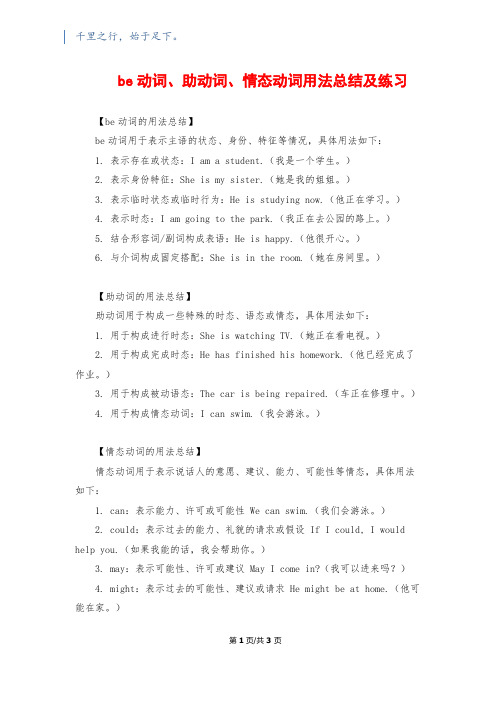
千里之行,始于足下。
be动词、助动词、情态动词用法总结及练习【be动词的用法总结】be动词用于表示主语的状态、身份、特征等情况,具体用法如下:1. 表示存在或状态:I am a student.(我是一个学生。
)2. 表示身份特征:She is my sister.(她是我的姐姐。
)3. 表示临时状态或临时行为:He is studying now.(他正在学习。
)4. 表示时态:I am going to the park.(我正在去公园的路上。
)5. 结合形容词/副词构成表语:He is happy.(他很开心。
)6. 与介词构成固定搭配:She is in the room.(她在房间里。
)【助动词的用法总结】助动词用于构成一些特殊的时态、语态或情态,具体用法如下:1. 用于构成进行时态:She is watching TV.(她正在看电视。
)2. 用于构成完成时态:He has finished his homework.(他已经完成了作业。
)3. 用于构成被动语态:The car is being repaired.(车正在修理中。
)4. 用于构成情态动词:I can swim.(我会游泳。
)【情态动词的用法总结】情态动词用于表示说话人的意愿、建议、能力、可能性等情态,具体用法如下:1. can:表示能力、许可或可能性 We can swim.(我们会游泳。
)2. could:表示过去的能力、礼貌的请求或假设 If I could, I would help you.(如果我能的话,我会帮助你。
)3. may:表示可能性、许可或建议 May I come in?(我可以进来吗?)4. might:表示过去的可能性、建议或请求 He might be at home.(他可能在家。
)第1页/共3页锲而不舍,金石可镂。
5. must:表示必须、推测、肯定或建议 You must finish your homework.(你必须完成作业。
be动词、助动词、情态动词用法总结及练习(答案)

助动词do/does
什么是助动词?
顾名思义,助动词就是帮助动词的,而本身没有 实际意义的动词,是具有雷锋精神的词汇。
助动词do的三种变化形式
do 第三人称单数时使用的does 过去式did
do的基本用法:
1 构成否定句 2 构成一般疑问句及回答 3 构成特殊疑问句
do的各种形式
肯定式:do 否定式:don't/do not do用在第一人称单复数、第二人称单复数和第三人称复 数作主语,且时态为一般现在时的句子,如:
4. shall的用法
1)shall常用于第一人称,表示简单的将来,构成将来时态。(助词)
ex: I shall think it over and let you know my idea.
When shall we meet again?
We shall have a good time in the park. 2) shall用于第一人称,还可以表示征求对方的意愿。
ex: My brother is ill, so I have to call the doctor in the middle of the night. 2) have to有人称、时态和单复数上的变化,而must只有一种形式。
have to → had to I have to/she has to
shall和will的对比
1)shall和will作为助动词可以与动词原形一起构成将来时。如: I shall study harder at English. 我将更加努力学习英语。 He will go to Shanghai. 他要去上海。
2)以前的语法中,shall用于第一人称,will只用于第二、第三人称。现在,尤其 是在口语中,will常用于第一人称,但shall只用于第一人称,如果用于第二、第三 人称,就不再有“将要”的意义,就变成命令、警告或威胁的意思了。
中考英语第二轮语法复习-主谓一致

Not only Jim but also his parents want to live in China.
不仅吉姆而且他的父母想居住在中国。 He or you have taken my pen.
他或你拿了我的钢笔。
4. “主谓一致”最基本的原则是:单数主语用单数谓语动词;
复数主语用复数谓语动词。但在实际运用中情况比较复杂,现
时,谓语动词用单数。
如:Ten years is a long time. 十年是一段很长的时间。
(8)由Here/There开头的句子,其主语不止一个时,谓语动词
通常与邻近的主语保持一致。 如:Here comes the bus.
公共汽车来了。
感悟中考
【例1】 (2011 河北)
D There ________ lots of people at the restaurant when I got there. A. is C. are B. was D. were
将同学们常犯的错误归纳如下: (1)并列连词and连接并列主语
①and连接两个或多个单数名词(代词)或不可数名词并列共
同作主语时,谓语动词用复数。 如:My friend and I are going to the cinema this weekend. 这个周末我的朋友和我要去看电影。
②and 连接两个名词的并列主语,表示同一个概念时,谓语
如:The number of wild animals is becoming smaller and smaller.
野生动物的数量正在减少。
A number of wild animals are in danger. 很多野生动物正处于危险中。
Be动词的用法及练习
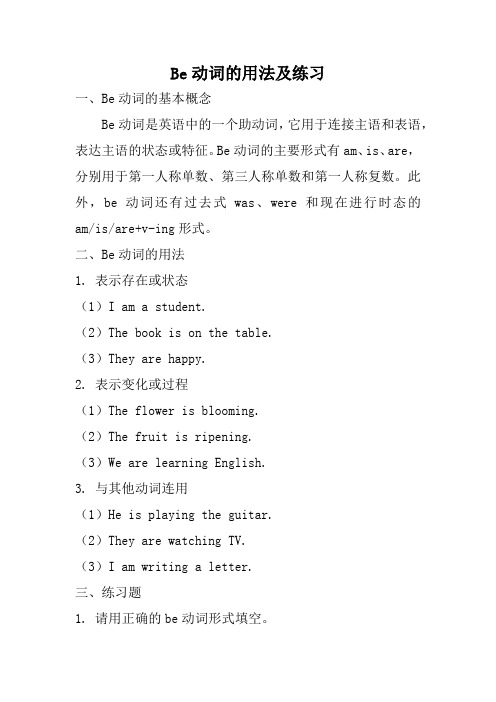
Be动词的用法及练习一、Be动词的基本概念Be动词是英语中的一个助动词,它用于连接主语和表语,表达主语的状态或特征。
Be动词的主要形式有am、is、are,分别用于第一人称单数、第三人称单数和第一人称复数。
此外,be动词还有过去式was、were和现在进行时态的am/is/are+v-ing形式。
二、Be动词的用法1. 表示存在或状态(1)I am a student.(2)The book is on the table.(3)They are happy.2. 表示变化或过程(1)The flower is blooming.(2)The fruit is ripening.(3)We are learning English.3. 与其他动词连用(1)He is playing the guitar.(2)They are watching TV.(3)I am writing a letter.三、练习题1. 请用正确的be动词形式填空。
(1)I ________ (am/is/are) a student.(2)He ________ (am/is/are) tall.(3)We ________ (am/is/are) studying together.2. 请将下面的句子翻译成英文。
(1)这个苹果是酸的。
This apple is sour.(2)我们正在看电视。
We are watching TV.(3)他喜欢读书。
He likes reading books.3. 请根据所给情境选择正确的be动词形式。
(1)当你想要描述自己正在做的事情时,应该使用哪个be 动词形式?________ (am/is/are)(2)当你想要描述某物是什么样子时,应该使用哪个be动词形式?________ (am/is/are)。
用适当形式填空解题技巧及练习
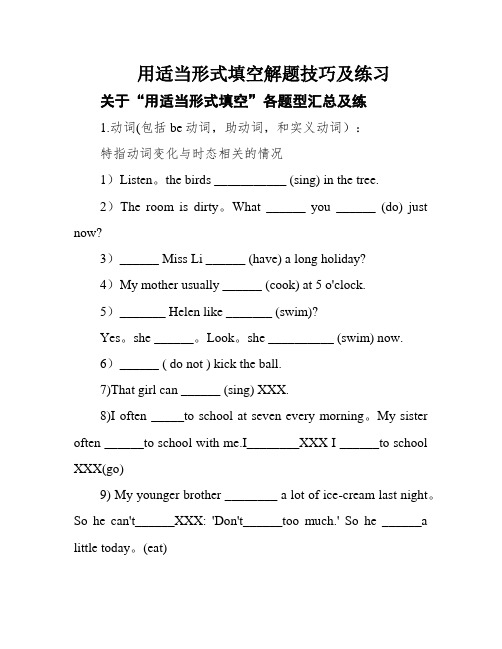
用适当形式填空解题技巧及练习关于“用适当形式填空”各题型汇总及练1.动词(包括be动词,助动词,和实义动词):特指动词变化与时态相关的情况1)Listen。
the birds ___________ (sing) in the tree.2)The room is dirty。
What ______ you ______ (do) just now?3)______ Miss Li ______ (have) a long holiday?4)My mother usually ______ (cook) at 5 o'clock.5)_______ Helen like _______ (swim)?Yes。
she ______。
Look。
she __________ (swim) now.6)______ ( do not ) kick the ball.7)That girl can ______ (sing) XXX.8)I often _____to school at seven every morning。
My sister often ______to school with me.I________XXX I ______to school XXX(go)9) My younger brother ________ a lot of ice-cream last night。
So he can't______XXX: 'Don't______too much.' So he ______a little today。
(eat)10) Last week。
I ______ a Beijing opera show。
It was interesting。
I am _________________ it again next week.(see)2.数词:考虑基数词---序数词的转化1)It's the ______ of May。
be动词用法和助动词

英语中be动词用法和助动词--do1.由be动词am,is,are构成的句子:变一般疑问句时把am,is,are提到句子的前面,句尾用问号即可。
变否定句时直接在am,is,are后面加not即可。
例如:肯定句:He is a student.一般疑问句: Is he a student?否定句: He is not a student.画线提问: 对he提问: Who is a student?对 a student 提问: What is he? / What does he do?2.由情态动词can, may, should等构成的句子: 变一般疑问句时把can, may, should提到句子的前面,句尾用问号即可。
变否定句时直接在can, may, should后面加not即可.例如: 肯定句: She can swim.一般疑问句: Can she swim?否定句: She can not swim.画线提问: 对she提问: Who can swim?对swim提问: What can she do?3.由行为动词构成的句子: 需要加助词do或does. 变一般疑问句时把do/does放在句子前面. 变否定句时,在动词前加don’t/ doesn’t即可。
例如: 肯定句: They play football after school.一般疑问句: Do they play football after school?否定句: They don't (do not) play football after school.画线提问: 对they提问: Who play football after school?对play football提问: What do they do after school?对after school提问: When do they play football?当题目要求是填入适当的be动词或助动词时,一般情况下,看到形容词或名词,就用be动词;看到有表示实际意义的动词(动词原形),就用助动词。
高中be动词助动词练习题及讲解

高中be动词助动词练习题及讲解### 高中英语be动词助动词练习题及讲解#### 练习题1. 填空题:- 用适当的be动词形式填空。
- The book __ (be) on the table.- She __ (be) a student at this school last year.2. 选择题:- Choose the correct form of the verb to complete the sentence.- Where __ (are/is) you going?- The weather __ (has been/is) very hot lately.3. 改错题:- Identify and correct the incorrect use of the verb "be". - She was a student at this school last year. (No correction needed)- The children are playing in the park. (No correction needed)4. 翻译题:- Translate the following sentences into English.- 他昨天是这个学校的一名学生。
- 这些书在桌子上。
5. 写作题:- Write a short paragraph using the correct form of the verb "be".- 描述你的朋友昨天的日常生活。
#### 讲解在英语中,"be"动词是最基本的连系动词之一,用来连接主语和它的补语。
它有三种基本形式:am, is, are,以及它们的过去式和过去分词形式was, were, been。
1. 填空题:- 第一个空格应填入"is",因为"the book"是单数名词。
一般现在时be动词助动词练习题

一般现在时be动词助动词练习题一般现在时是英语中最基本的时态之一,它用于描述经常性、习惯性的动作或者客观事实。
在这个时态中,be动词是最常见的助动词之一,它有三个形式:am、is、are。
下面是一些关于一般现在时和be动词的练习题及参考答案:一、填空题:1. My brother ______ a doctor.参考答案:is2. We ______ having a party tonight.参考答案:are3. They ______ my best friends.参考答案:are4. She ______ in the office right now.参考答案:is5. ______ you a student?参考答案:Are二、选择题:1. My parents ______ teachers.A. amB. isC. are参考答案:C2. I ______ at home.A. isB. amC. are参考答案:B3. ______ they from China?A. AmB. IsC. Are参考答案:C4. She ______ my sister.A. amB. isC. are参考答案:B5. We ______ playing soccer now.A. isB. amC. are参考答案:C三、改错题:1. He am going to the park tomorrow.参考答案:am → is2. We is studying English now.参考答案:is → are3. You are my best friend.参考答案:无错误四、完成句子:1. The weather __________ fine today.参考答案:is2. I ______ from Japan.参考答案:am3. They ______ going to the cinema tonight.参考答案:are4. ______ you a student?参考答案:Are5. She ______ not at home right now.参考答案:is以上是关于一般现在时和be动词的一些练习题及参考答案。
be动词和助动词的用法口诀
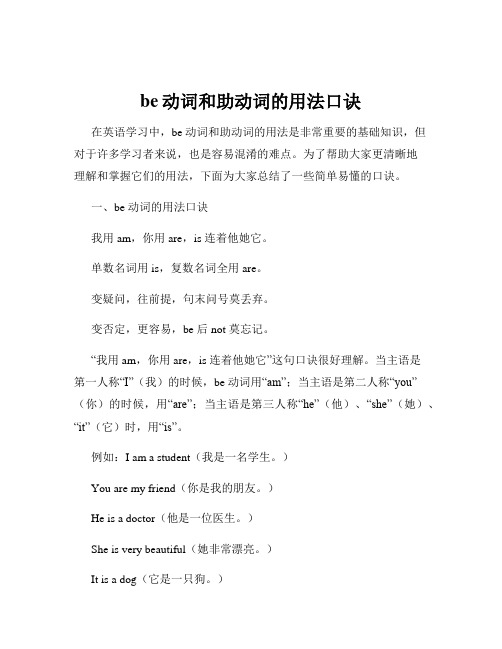
be动词和助动词的用法口诀在英语学习中,be 动词和助动词的用法是非常重要的基础知识,但对于许多学习者来说,也是容易混淆的难点。
为了帮助大家更清晰地理解和掌握它们的用法,下面为大家总结了一些简单易懂的口诀。
一、be 动词的用法口诀我用 am,你用 are,is 连着他她它。
单数名词用 is,复数名词全用 are。
变疑问,往前提,句末问号莫丢弃。
变否定,更容易,be 后 not 莫忘记。
“我用 am,你用 are,is 连着他她它”这句口诀很好理解。
当主语是第一人称“I”(我)的时候,be 动词用“am”;当主语是第二人称“you”(你)的时候,用“are”;当主语是第三人称“he”(他)、“she”(她)、“it”(它)时,用“is”。
例如:I am a student(我是一名学生。
)You are my friend(你是我的朋友。
)He is a doctor(他是一位医生。
)She is very beautiful(她非常漂亮。
)It is a dog(它是一只狗。
)“单数名词用 is,复数名词全用are”是指当主语是一个单数的名词时,be 动词用“is”;当主语是复数的名词时,用“are”。
比如:This pen is red(这支钢笔是红色的。
)Those books are mine(那些书是我的。
)要将陈述句变为疑问句,需要把 be 动词提到主语前面,句末加上问号。
像:She is a teacher (她是一名老师。
)变为疑问句就是:Is she a teacher? (她是一名老师吗?)将陈述句变为否定句,就在 be 动词后面加上“not”。
例如:They are happy (他们很开心。
)否定句就是:They are not happy (他们不开心。
)二、助动词的用法口诀助动词,挺神奇,帮助实义动词变形式。
do/does 用于一般现在,did 过去常出现。
否定疑问靠它们,动词原形跟后面。
be动词与助动词练习题

练习题一、用正确的Be动词填空1.This man under the tree my father.2.Two dogs playing with a doll.3.Sleeping in class not good for our study.4.Bob and Henry not friends.5.This cat’s tail very short.6.Staying up late and playing computer games harmful(有害的).7.I a student while she a teacher. And they workers.8. There a pen and three books in his schoolbag.9. there any bus around here?10. There an old woman in the village three years ago.11. There two trees in front of my house in 2014.二、中译英翻译1>我不想学习2>狗不吃水果3>周杰伦不用微博4>她昨天没来学校5>你父母去过北京吗?三、用合适的助动词填空:11. You need to do homework.你不需要做作业12. They have any money.他们没有钱13. Bob play basketball? Bob踢足球吗?14. plants need water?植物需要水吗?15.Many people know the importance of English.很多人不知道英语的重要性。
四、英译中翻译1>你是做什么(工作)的?2>你妈妈在哪里?3>你为什么上课又迟到了?4>她的长相是什么样子的?5>你认为1902班怎么样?6>你爸爸多少岁了?参考答案:一、1.is 2. are 3. is 4. are 5. is 6. are 7. am, is, are 8. are 9.Is10. was 11. Were二、1>I don’t want to study.2>Dogs don’t eat fruits.3>Jay Chou doesn’t use microblog.4> She didn’t come to school yesterday.5> Did your parents go to Beijing?三、1. don’t 2. don’t 3. Does 4. Do 5. don’t四、1.What does your mother do?/What is your mother2.Where is your mother?3.Why are you late for class again?4.What does she look like?5.What do you think of Class 1902?/How do you like Class 1902/ How do you find Class 1902/ What’s your opinion of Class 1902?6. How old is your father?。
be动词的用法及练习题
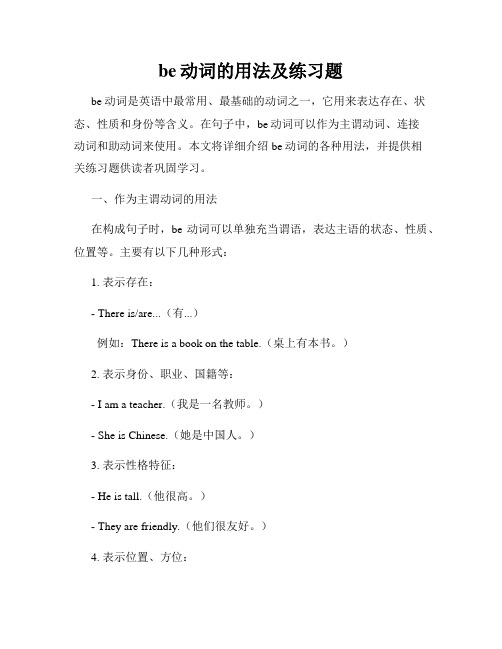
be动词的用法及练习题be动词是英语中最常用、最基础的动词之一,它用来表达存在、状态、性质和身份等含义。
在句子中,be动词可以作为主谓动词、连接动词和助动词来使用。
本文将详细介绍be动词的各种用法,并提供相关练习题供读者巩固学习。
一、作为主谓动词的用法在构成句子时,be动词可以单独充当谓语,表达主语的状态、性质、位置等。
主要有以下几种形式:1. 表示存在:- There is/are...(有...)例如:There is a book on the table.(桌上有本书。
)2. 表示身份、职业、国籍等:- I am a teacher.(我是一名教师。
)- She is Chinese.(她是中国人。
)3. 表示性格特征:- He is tall.(他很高。
)- They are friendly.(他们很友好。
)4. 表示位置、方位:- The cat is under the table.(猫在桌子下面。
)- The museum is beside the park.(博物馆在公园旁边。
)二、作为连接动词的用法be动词还可以连接主语与表语,起到连接两者的作用。
表语可以是形容词、名词、代词、副词等。
具体用法如下:1. 形容词作表语:- She is happy.(她很开心。
)- The book is interesting.(这本书很有趣。
)2. 名词作表语:- He is a doctor.(他是一名医生。
)- They are students.(他们是学生。
)3. 代词作表语:- My brother is him.(我弟弟就是他。
)- She is me.(她就是我。
)4. 副词作表语:- The cake tastes delicious.(这个蛋糕尝起来很美味。
)- The room looks clean.(房间看起来很干净。
)三、作为助动词的用法be动词还可与其他动词形成时态、语态等。
do和be的练习

一、用be动词和助动词(do, does, did )的适当形式填空。
1.---What______ you do last Sunday? ---I wrote to my friend.2.—I ______ a boy. ______ you a boy?—No, I _____ not.3.The girl______ Jack's sister.4.---How many kites ______we have? ---We have ten.5.The dog _______ tall and fat two years ago.6. ______Jenny and Tony go to school on foot every day?7. ______ your brother in the classroom?8.How _______ your father?9. Mike and Tom ______ at school yesterday.10.Whose dress ______ this?11. ______Jim have a picnic with his family every Saturday?Yes, he______.12.Whose socks ______ they?13.Who ______ I?14.The jeans ______ on the desk a moment ago.15.Here ______ a scarf for you.16.He ______not visit a farm last National Day holiday.17.Here ______ some sweaters for you.18.---What ______ she ______ at the weekends? ---She usually plays games with her friends.19.Some tea ______ in the glass just now.20.The girl______like bread for breakfast.21.My sister's name ______Lisa.22.______ Mary and Helen from England?23.They______ not like playing volleyball.24.There ______ a girl in the room.25.There ______ some apples on the tree.26._______ there any apple juice in the bottle?27.---Did you see a Beijing opera? ---No, I ______.28.There _______ some bread on the plate this morning.29. ______you like this magazine?30.You, he and I ______ from China.31.There _______ a boy, two girls, three men and ten women in the park.32.--- ______there a post office near your school? ---Yes, there ______.二、找出下列句子中的错误,并改正。
- 1、下载文档前请自行甄别文档内容的完整性,平台不提供额外的编辑、内容补充、找答案等附加服务。
- 2、"仅部分预览"的文档,不可在线预览部分如存在完整性等问题,可反馈申请退款(可完整预览的文档不适用该条件!)。
- 3、如文档侵犯您的权益,请联系客服反馈,我们会尽快为您处理(人工客服工作时间:9:00-18:30)。
Ⅰ. 用适当的be动词或助动词填空。
1. Every student _______ got a book.
2. The number of students in the school _______ now rising.
3. A number of boys _______ playing basketball at the moment.
4. There _______ something else in the desk.
5. Tom, together with his mother, _______ gone to New Y ork.
6. The teacher with two students _______ playing sports.
7. This pair of trousers _______ made by my aunt last year.
8. Five months _______ a long time to wait.
9. Here _______ some books.
10. To clean the room _______ your duty.
Ⅱ. 用括号内所给动词的适当形式填空。
11. When I got there, they each _______ (read) a book.
12. Neither of us _______ (like) the storybook.
13. Everyone except me _______ (go) to the cinema yesterday.
14. A football team often _______ (have) eleven players.
15. No one but my parents _______ (know) the truth.
16. Jim’s family _______ (enjoy) watching TV after supper.
17. What you said _______ (be) quite useful to us.
18. Look! The class _______ (do) morning exercise on the playground.
19. Twenty years _______ (have) passed since he left his hometown.
20. Three glasses of milk _______ (be) enough for us.
Ⅲ. 单项选择
( )21. Either Tom or I ______ going there tomorrow.
A. are
B. is
C. am
D. be
( )22. Jenny as well as her friends ______ swimming.
A. are going
B. has gone
C. were going
D. have gone
( )23. No one ______ swimming in such bad weather.
A. like
B. likes
C. liking
D. liked
( )24. —What ______ the number of the students in your school?
—About two thousand. A number of them ______ from the USA.
A. is; are
B. is; is
C. are; is
D. are; are
( )25. I hear one third of the books in Wuhu Library ______ new. Let’s borrow some.
A. is
B. are
C. was
D. were
( )26. Good news! There ______ fewer people catching this kind of illness now.
A. are
B. is
C. was
D. were
( )27. The news ______ very interesting! Tell me more!
A. is
B. are
C. were
D. was
( )28. —I don’t think it’s good to drive eight hours without a rest.
—I agree. Eight hours ______ really a very long time.
A. has
B. is
C. are
D. am
( )29. Either Tom or she ______ going to the party next week. One of them must stay at home.
A. are
B. was
C. is
D. be
( )30. This is my twin sister Lucy. Both she and I ______ good at drawing.
A. am
B. is
C. are
D. be
( )31. Now the students each ______ an English-Chinese dictionary.
A. has
B. have
C. is having
D. are having
( )32. One of my friends ______ already moved to London.
A. do
B. does
C. have
D. has
( )33. I think physics ______ more difficult than Chinese.
A. is
B. are
C. have
D. has
( )34. Not only Jim but also his sister ______ a few cities since they came to China.
A. will visit
B. has visited
C. have visited
D. visited
( )35. Neither Jim nor his cousins ______ to France, but ______ of them know the country very well.
A. have been; all
B. have been; both
C. has been; all
D. has been; both。
